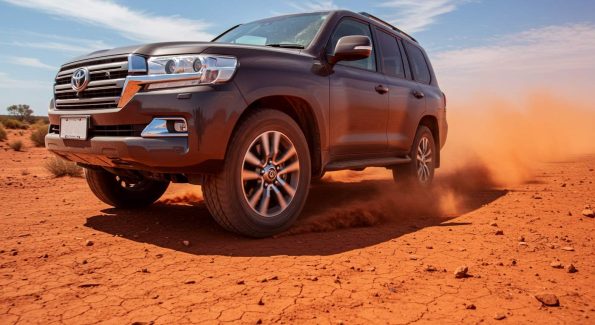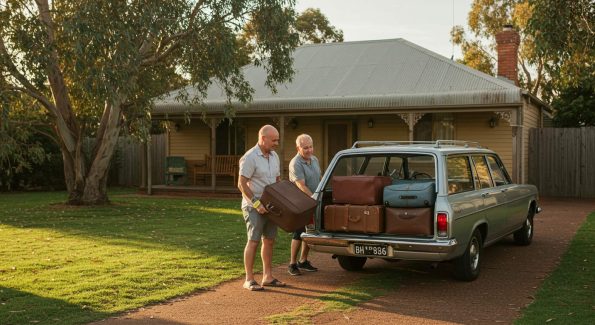Australians love long road trips. There’s just something about driving for hours with the breeze hitting your hair and the wide, open road stretching out ahead of you.
But while the sense of adventure is undeniable, the practical side of things can’t be ignored. Road trips can often be full of unknowns and uncertainties. This is even more true when going to the outback in the remotest parts of the country.
Here are our tips for prepping your car for a long road journey.
Schedule a Comprehensive Service
Before setting off, have a mechanic carry out a full inspection. This should include:
- Fluid checks: Oil, coolant, brake fluid, transmission fluid and power steering fluid.
- Brake inspection: Pads, rotors and brake lines for wear or leaks.
- Suspension and steering: Ensure components are in good shape for varied terrain.
- Belts and hoses: Look for cracks, fraying or swelling.
- Battery: Test for charge and inspect terminals for corrosion.
Make sure all your logbooks and service history are up to date. This way, whether you’re seeing a mechanic in Bundaberg, Broome or Bourke, they’ll have the complete record of your car’s mechanical history to work from.
Check Your Tyres
Inspect tread depth, look for signs of uneven wear, and ensure they’re inflated to the manufacturer’s recommended pressure.

If you’re venturing off-road, consider all-terrain or mud-terrain tyres, and always check the spare is in good condition; an off-road driving course is a good idea. Carry a portable air compressor so you can adjust pressures for sand, gravel, or sealed roads. Check this before you go because not all air compressors are made equal; some take an eternity to fill a tyre, are very noisy, and may not even be able to fill to the advertised pressure.
Have Your Emergency and Recovery Gear
Emergencies are not planned. They can come at any time. It’s best to be prepared and have all the necessary gear to face unforeseen challenges.
At a bare minimum, make sure to take jumper leads, a tyre repair kit, a jack and extra fluids like oil, coolant and brake fluids. If you’re travelling to the outback, also add recovery tracks, a winch and a high-visibility safety vest for roadside stops. Taking all these items will ensure that you tackle adversity better.
Your other emergency gear should be to take care of you. Ensure you have appropriate clothing, and enough water and food.
Plan Your Fuel and Rest Stops
Having a proper itinerary of your route can help you save on fuel. This is vital as sometimes, fuel stations can be hundreds of kilometres apart from each other. Always top up your fuel whenever you see a fuel station after a long haul. Carry jerrycans to be on the safer side. If you are riding an EV, route planning becomes even more critical.
While there are more than 2500 charging stations across Australia, their availability in remote areas can be quite spread out.
Protect Your Vehicle
Remote terrain demands robust vehicles and strong protection, especially if you intend to drive off-road. This can include scratches and dents, as well as more serious issues that can affect important components like the engine.
Having specialised protective gear like bull bars can be a great asset in such situations. Bull bars can protect the front end of your car, including the bumper, grille and headlights.
Load Smart and Balance Weight

How you pack your vehicle has a big impact on safety and performance. If you overload your vehicle or even load unevenly, it can compromise handling, make braking inefficient and even impact the efficiency of fuel consumption.
It’s advised that while loading, the heavier items be kept as close to the centre of gravity as possible. This improves vehicle stability when travelling on unstable and suddenly turning roads. Be mindful of load distribution even when selecting the sides. Don’t overload any one of the sides. Finally, make sure everything is securely tied. Be very wary of items that can act like projectiles, as they will turn out to be dangerous when braking suddenly.
Have a Communications Backup
In many parts of Australia, telecom reception can be very unreliable and sometimes even non-existent. This is why it’s crucial that you share your itinerary and expected arrival times with family or friends so someone knows where you should be at any given point.
Having a reliable satellite phone as a backup can also alleviate your concerns about being out of touch in far-flung places.
Car prep can be a cumbersome job, but it is necessary to keep things running smoothly. If you don’t want your road trip to be eventful in a bad way, it’s best to be prepared and take utmost caution.
Schedule a comprehensive car check and servicing before starting a long trip. Be very meticulous while checking your tyres and ensure that the spare one is in ideal condition as well. Have your emergency and recovery gear in pristine condition and ready for action. Plan your fuel stops very carefully, as remote regions tend to have them hundreds of kilometres apart. Use things like bull bars to protect your vehicle from excessive damage. Load smartly and spread things out. Keep things as close to the centre of gravity as possible. Finally, take care of communication by ensuring you’re able to be in touch with others while you’re out on the road. Buy a satphone and tell someone about your itinerary.
The good news? With everything in order, you’ll be free to enjoy the open highway and everything that comes along the way.
